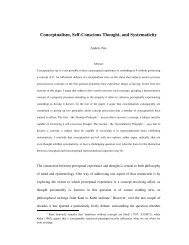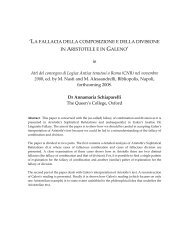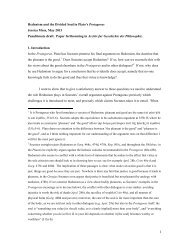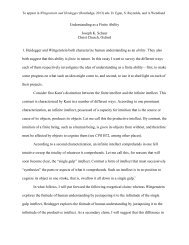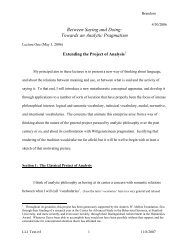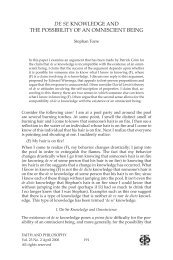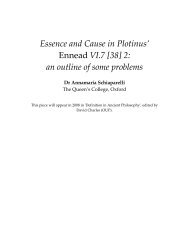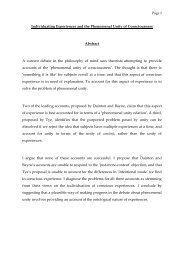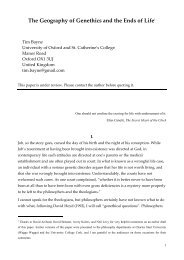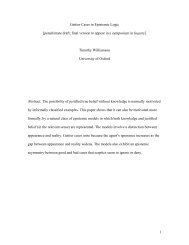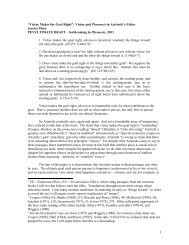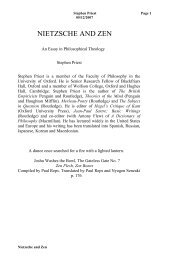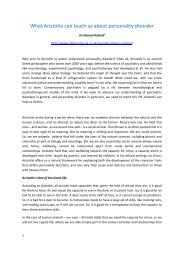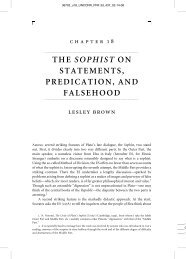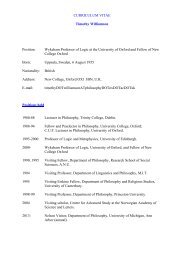OxfordPhilosophy - Faculty of Philosophy - University of Oxford
OxfordPhilosophy - Faculty of Philosophy - University of Oxford
OxfordPhilosophy - Faculty of Philosophy - University of Oxford
You also want an ePaper? Increase the reach of your titles
YUMPU automatically turns print PDFs into web optimized ePapers that Google loves.
John Lloyd Ackrill<br />
30 November 2007<br />
John Lloyd Ackrill was<br />
one <strong>of</strong> the leading ancient<br />
philosophers <strong>of</strong> the twentieth<br />
century. Together with Gwil<br />
Owen and Gregory Vlastos he<br />
revolutionised the way ancient<br />
philosophy is done through<br />
a passionate commitment to<br />
approaching ancient texts with<br />
philosophical rigour and sophistication as well as meticulous<br />
scholarship.<br />
Ackrill spent almost his whole pr<strong>of</strong>essional career at<br />
Brasenose, initially as a Tutorial Fellow (1953-1966), and<br />
then as the first holder <strong>of</strong> the Pr<strong>of</strong>essorship <strong>of</strong> the History<br />
<strong>of</strong> <strong>Philosophy</strong> (1966-1989). It was characteristic <strong>of</strong> Ackrill<br />
to describe his work as merely pointing out or clarifying<br />
problems; and some <strong>of</strong> his work such as his influential<br />
‘Aristotle’s Definitions <strong>of</strong> Psuchē’ and his 1981 book,<br />
Aristotle the Philosopher is principally <strong>of</strong> this sort. Other<br />
writing – his ground-breaking articles on Plato’s Sophist and<br />
the famous lecture ‘Aristotle on Eudaimonia’ – display a less<br />
Socratic style; but even here Ackrill always steered clear <strong>of</strong><br />
overarching systems, preferring to work on the particularity<br />
<strong>of</strong> texts and problems. In 1960 he took over the editorship<br />
<strong>of</strong> the Clarendon Aristotle Series, whose aim was to present<br />
accurate translations <strong>of</strong> Aristotelian texts, and philosophical<br />
commentaries designed to help readers to think about<br />
these texts for themselves. The second volume to appear<br />
was Ackrill’s own on the Categories and De Interpretatione<br />
(1963). His translation set a remarkable standard for<br />
faithfulness and elegance; his illuminating and incisive<br />
commentary has been among the main stimuli for work in<br />
these areas ever since, and the book is one <strong>of</strong> the most<br />
cited works on ancient philosophy in the English-speaking<br />
world. Before retiring as editor in 2001 he oversaw the<br />
writing <strong>of</strong> nineteen other volumes in the Series.<br />
In his personal life, Ackrill displayed the same qualities<br />
found in his academic work. What colleagues found most<br />
striking about him was his modesty, his courtesy, kindness<br />
and unfailing good humour, a Socratic seriousness coupled<br />
with a quiet wit, and his love for his family.<br />
Gwynneth Matthews<br />
28 March 2008<br />
Gwynneth Matthews was Fellow<br />
in Classical <strong>Philosophy</strong> at St<br />
Anne’s from 1962 to 1987. She<br />
was born in 1925 and spent her<br />
early childhood in North Wales.<br />
Her sister Pauline remembers<br />
that her interest in classical<br />
literature was fired in part by the<br />
sight <strong>of</strong> an enrobed Dame Sybil<br />
Thorndike, a neighbour in Portmadoc, declaiming Medea on<br />
the family hearthrug. After a degree in Bangor, Gwynneth<br />
took a First in Greats at St Hugh’s in <strong>Oxford</strong>, and moved on<br />
to the BPhil and university posts at Exeter and Bangor.<br />
Gwynneth’s first publications concerned the nature <strong>of</strong><br />
inference. She had a deep and lifelong interest in the<br />
philosophy <strong>of</strong> science, from the Presocratics through<br />
Leibniz to the present day. Her linguistic and philosophical<br />
sensitivities are well illustrated in the introduction to Plato’s<br />
Epistemology and Related Logical Problems (1972), which<br />
included her own pellucid translations <strong>of</strong> key Platonic<br />
passages. Her paper on weakness <strong>of</strong> will (1966) is a<br />
classic, still cited, and its conclusion nicely exemplifies the<br />
openness <strong>of</strong> her mind to influences beyond philosophy: “If<br />
what one wants is an account <strong>of</strong> what happens in cases<br />
<strong>of</strong> weakness <strong>of</strong> will, one would do better to take a variety<br />
<strong>of</strong> cases ..., drawing material from poets, playwrights, and<br />
novelists, and from one’s own plentiful experience.” That<br />
knowing reference to individual experience cannot fail to<br />
bring to the minds <strong>of</strong> those who knew her Gwynneth’s<br />
quizzical smile. The quickness <strong>of</strong> her wit extended from her<br />
philosophy into the rest <strong>of</strong> her life.<br />
I was privileged to have Gwynneth as undergraduate<br />
tutor, and friend. She was a wonderful teacher – incisive,<br />
insightful, and deeply inspiring – and it was while reading<br />
Mill with Gwynneth that I began to have some idea <strong>of</strong> how I<br />
might want to spend my life. Like so many <strong>of</strong> her students, I<br />
am deeply in her debt, and miss her greatly.<br />
Roger Crisp<br />
He is survived by his wife Margaret, their four<br />
children and two grandchildren.<br />
Lindsay Judson<br />
15



